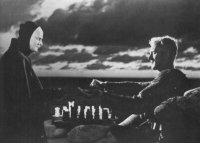Is It Really a Great Movie? Part Eight: The Seventh Seal
by dan heaton
Using Roger Ebert's Great Movies book as a guide, this series of articles will focus on all films included on his list that previously have escaped my notice. Since all lists are subjective, I am not treating Ebert's choices as the essential selection of films. However, his essays offer the perfect chance for me to explore both classics and lesser-known pictures from around the globe.

Swedish Director Ingmar Bergman filmed his first picture in 1946 and only retired from the industry recently in 2003. His remarkable output includes such heralded classics as Wild Strawberries, Persona, and the epic Fanny and Alexander. Many experts consider his greatest achievement to be The Seventh Seal, an allegory-filled gem that earned the Special Jury Prize at the Cannes Film Festival in 1957. The National Society of Film Critics also included this film in its book The A List, which listed their essential 100 films. Several memorable scenes, especially the chess game with Death, have been spoofed in light-hearted movies like Bill and Tedís Bogus Journey but remain poignant when viewed today.
The story takes place within the tragic era of the Black Death in medieval Europe. Returning from a 10-year journey to fight in the Crusades, the knight Antonius Block (Max von Sydow) and his squire Jons (Gunnar BjŲrnstrand) discover a nasty world of death and despair. The knight spends much of his time playing chess against Death himself (Bengt Ekerot) to save his life. Although this premise is very silly, the scenes crackle with intensity and depict Death as a devious trickster. He even disguises himself as a priest to learn Antoniusí chess strategy while listening to a dour confession. Apart from the game scenes and a few other silly appearances by Death, this film presents a bleak world where the existence of God remains in question. Villagers who show signs of the plague are quickly dispatched and add to their comradesí increasing fear.
Along with the ongoing chess game, this picture includes numerous other allegorical elements that could either frustrate or delight viewers. The kind, loving actors are named Mary and Joseph, and they also have a baby. When a young girl is labeled a witch and faces burning at the stake, her blank eyes are said to contain the Devilís thoughts. Questions about Godís existence dominate the struggles of each character, and the bleak landscape only heightens these doubts. The knight spends his time worrying about his role in the Crusades and appears resigned to his eventual death. True faith may lead to a less-painful death, but little chance appears to prevent humanityís inevitable demise. Light-hearted moments do occur, including a strange performance from the actors and the odd image of Death cutting down a tree, but the overall tone remains very dreary.
The Seventh Seal is tricky to review because its pure entertainment value falls below the typical Great Movie. Itís not a boring film, but the downbeat tone and slow-moving pace keep the story from becoming very involving. The characters act more as symbols than actual people, making it more difficult for audiences to identify with their dire situation. Bergman covers issues that few filmmakers will touch and raises interesting questions about our existence, but these topics donít really translate into a gripping viewing. The black-and-white cinematography is stunning, and the premise is definitely unique, which keeps the picture from becoming too tedious. Also, Max von Sydow brings some humanity to the knightís struggle with his inner demons. But he disappears for a significant time when the attention shifts to the less-notable villagers.
Roger Ebert compares The Seventh Seal to a silent film and describes how its subject matter and Bergmanís approach have lessened its impact with modern viewers. I can directly relate to this assessment because I struggled to find personal relevance within this unique story. During the final scenes, the knight reunites with his past love, but this moment sours due to Deathís ultimate arrival. After facing their destiny, the characters dance across the countryside, which ends the film on a very strange note. Iím happy to have seen this picture and believe it deserves a viewing, but I canít agree with its place on a list of Great Movies. Bergman delivers an original experience that has resonated with many filmgoers; however, my personal response wasnít strong enough to warrant this strong of a recommendation.
Copyright (c) 2006 erasing clouds |
|